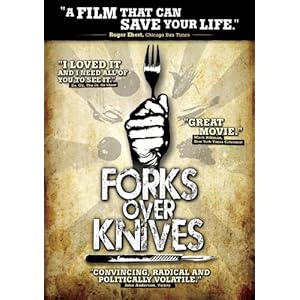
There's a few great documentaries out there about the American food industry and America's current obesity problem. I just wanted to hi-light a couple I've seen that I'd recommend to anyone who wants to get serious with their health and nutrition and another documentary that I hope to see soon that I've heard great things about. I'm not saying these documentaries are 100% right, but they'll open your mind up to some of the reasons why America has such a serious health epidemic surrounding what we put in our mouths.
FORKS OVER KNIVES

This is probably my favorite documentary and what inspired me most to experiment with a whole foods plant based diet. The concept of "forks over knives" is that we can prevent and at times even reverse serious diseases like heart disease and cancer by eating a whole foods plant based diet rather than relying on the knife at the surgery table to save our life. This documentary is based off The China Study, a huge study conducted in China that determined that people who ate a heavier animal protein diet involving meat and dairy increased their chances of disease and health problems than those who ate primarily plant foods. Definitely worth a watch, especially to see some of the dramatic health turnarounds people in the film experienced, which includes a woman using a plant based diet rather than chemotherapy to survive cancer, a woman with diabetes no longer needing medication after eating a plant based diet, and two men who make dramatic improvement in their cholesterol, blood pressure, and other health measurements. Here's the official description of the film and its trailer.
What has happened to us? Despite the most advanced medical technology in the world, we are sicker than ever by nearly every measure. Cases of diabetes are exploding, especially amongst our younger population. About half of us are taking at least one prescription drug and major medical operations have become routine. Heart disease, cancer and stroke are the country's three leading causes of death, even though billions are spent each year to "battle" these very conditions. Millions suffer from a host of other degenerative diseases. Could it be there's a single solution to all of these problems? A solution so comprehensive, but so utterly straightforward, that it's mind-boggling that more of us haven't taken it seriously? FORKS OVER KNIVES examines the profound claim that most, if not all, of the so-called "diseases of affluence" that afflict us can be controlled, or even reversed, by rejecting our present menu of animal-based and processed foods. The major storyline in the film traces the personal journeys of Dr. T. Colin Campbell, a nutritional scientist from Cornell University, and Dr. Caldwell Esselstyn, a former top surgeon at the world renowned Cleveland Clinic. Inspired by remarkable discoveries in their young careers, these men conducted several groundbreaking studies, one of which is considered among the most comprehensive health-related investigations ever undertaken. Their research separately and independently led them to the same startling conclusion: degenerative diseases like heart disease, type 2 diabetes, and even several forms of cancer, could almost always be prevented-and in many cases reversed-by adopting a whole foods, plant-based diet. Despite the profound implications of their findings, their work has remained relatively unknown to the public. In addition, cameras follow "reality patients" who have chronic conditions from heart disease to diabetes. Doctors teach these patients how to adopt a whole foods plant-based diet as the primary approach to treat their ailments-while the challenges and triumphs of their journeys are revealed.
FOOD INC

Food Inc is a documentary that takes a look at America's corporate controlled food industry and the negative effects it is having on our nutritional health. It really opens up your eyes to the uncleanliness of farms and factories where our sources of food come from, the treatment of animals, and how big food corporations put money first over our health. Here's the description and trailer.
The current method of raw food production is largely a response to the growth of the fast food industry since the 1950s. The production of food overall has more drastically changed since that time than the several thousand years prior. Controlled primarily by a handful of multinational corporations, the global food production business - with an emphasis on the business - has as its unwritten goals production of large quantities of food at low direct inputs (most often subsidized) resulting in enormous profits, which in turn results in greater control of the global supply of food sources within these few companies. Health and safety (of the food itself, of the animals produced themselves, of the workers on the assembly lines, and of the consumers actually eating the food) are often overlooked by the companies, and are often overlooked by government in an effort to provide cheap food regardless of these negative consequences. Many of the changes are based on advancements in science and technology, but often have negative side effects. The answer that the companies have come up with is to throw more science at the problems to bandage the issues but not the root causes. The global food supply may be in crisis with lack of biodiversity, but can be changed on the demand side of the equation.
HUNGRY FOR CHANGE

I have not seen this documentary yet but just ordered it. It's gotten great reviews. It's similar to the two other films above, but also touches upon how our diet affects our mental and spiritual well-being.
'Hungry For Change', the latest 'Food Matters' film, exposes shocking secrets the diet, weightloss and food industry don't want you to know about. Deceptive strategies designed to keep you craving more and more. Could the foods we are eating actually be keeping us stuck in the diet trap?


